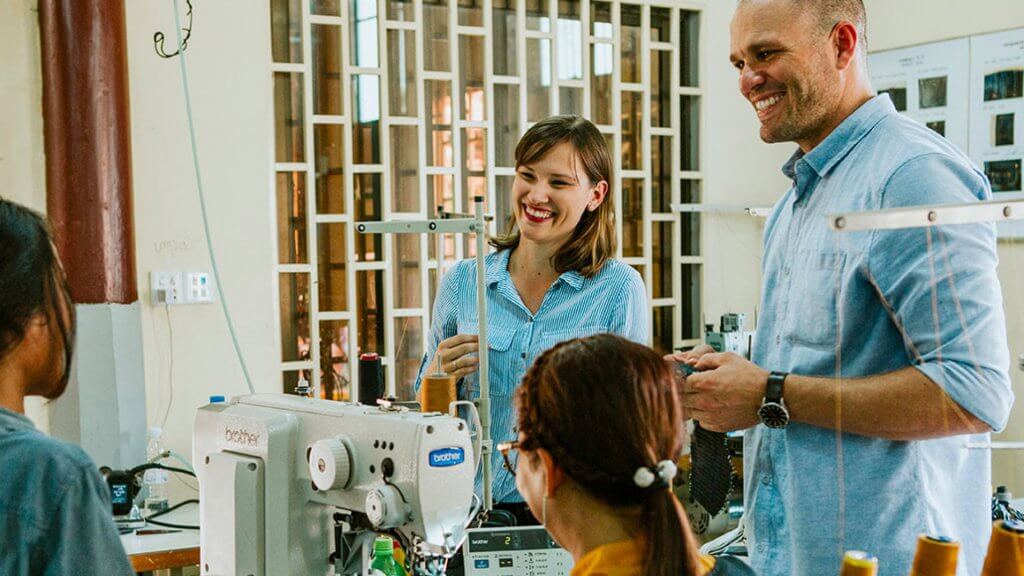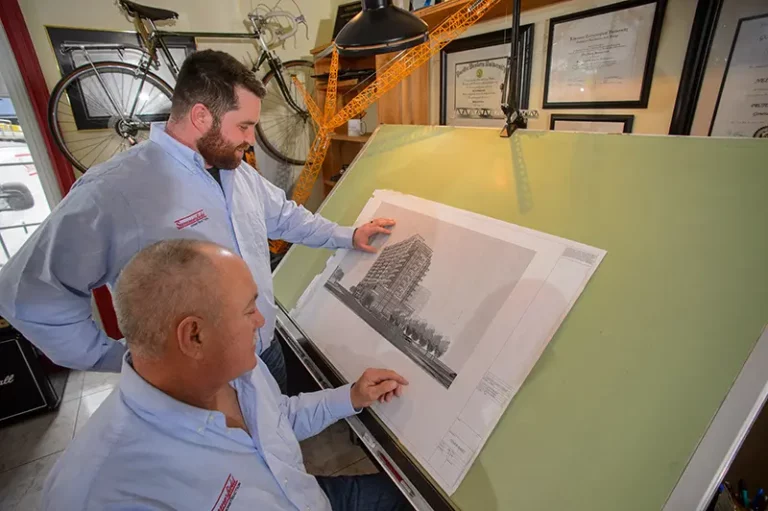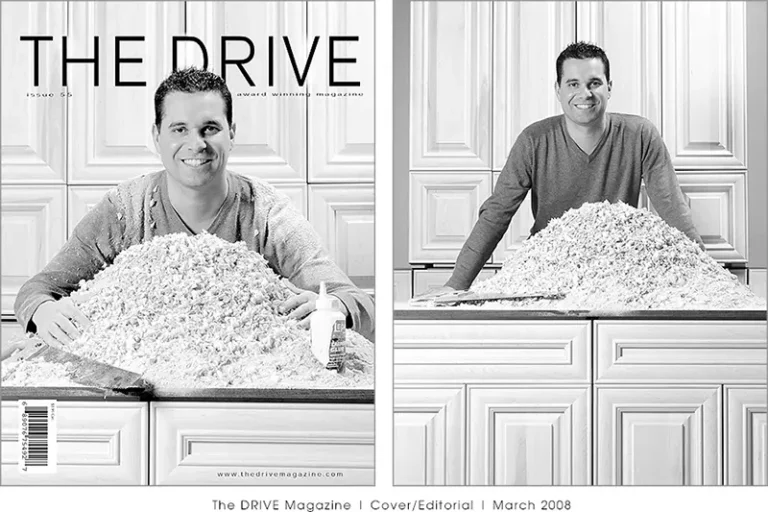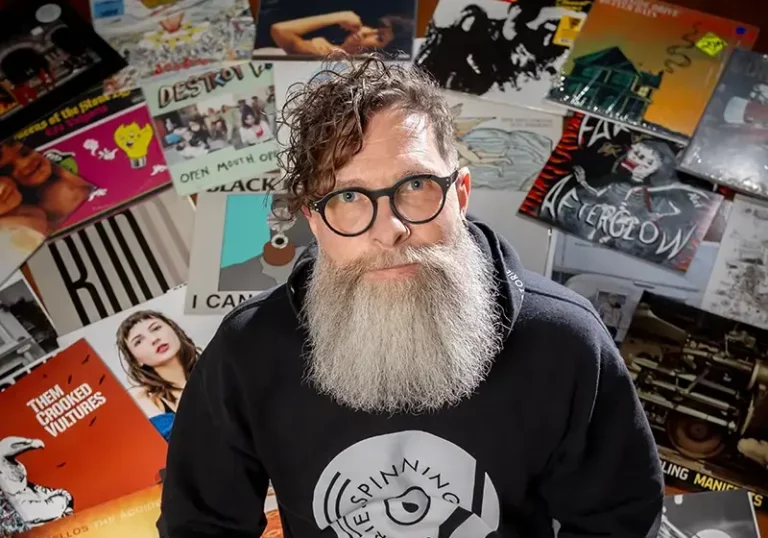When Canadian entrepreneurs Lauren and Mike Purkis attended an event for CEOs in New York two years ago, little did they know their lives were soon to be changed by an encounter with a friendly Australian.
Nor could they have known the newest Duchess in the British royal family would also play a role in their lives.
Their story begins in New York City.
“We were at the Women’s Wear Daily conference and really knew nobody, but somehow this Aussie and the Canadians found each other, had a beer together, and chatted,” Lauren recalls, smiling at the memory.
They liked James Bartle but, more importantly, they were intrigued by the story he told them about his product, Outland Denim, and the reason he brought it to market: his mission was to help save women and girls from the sex and labour trafficking industry in Cambodia. Bartle was at the conference looking for information about the American market for his denim brand, which he had started in 2011.
“We were impressed by what he had accomplished over the past six years but were not sure how we could get involved, only that we knew we probably should. We told him we needed to see the product to make sure it was a quality we could get behind,” said Lauren. “We also told him we would help him make sure he got to all the right people to help him in Canada.”
Lauren and Mike returned to Toronto. They ordered the jeans, tried them on, and approved of their cut, styling, and quality. They still had not decided how or if they wanted to become involved with the project. But, remembering the stories they’d heard from Bartle about human trafficking and doing their own research, they were beginning to understand how important this enterprise could be in the lives of so many abused human beings.
The story about how James Bartle came to devote his life and career to an anti-trafficking mission is one he tells passionately, leaving no doubt about his dedication and sincerity. Over a lengthy cellphone call while sitting in an airport in New Zealand, waiting to travel home to Australia, he is energized as he explains how he became involved with the cause and how it is shaping the lives of him and his family.
His first encounter with the sordid world of human trafficking started when he watched the movie Taken, starring Liam Neeson—it’s the story about a CIA agent who searches across Europe for his daughter who has been kidnapped on a trip to Paris. “This movie rattled me because women and children can be so vulnerable,” he said. “Then I was at a music festival in 2011 and met some people working with an anti-trafficking group who told me about the awful stories they were hearing. I knew I had to do something.”
Bartle decided he needed to learn more and travelled to Thailand and Cambodia where he says he saw firsthand the effects of human trafficking, and how the traffickers prey on young girls
“I saw a little girl about 12 or 13 for sale and I had two young nieces at the time, and I now have two young daughters, and it was clear to me that I couldn’t ignore the problem. I also realized after visiting with the agency Destiny Rescue that once people are rescued from a situation like this they need a lot of psycho-social care, but they need more than counselling. Handouts work only in the short term, but they can be just a band-aid solution. What these women need are training and skills, they need a place to live safely, and they need a wage that gets them out of poverty, which is one of the greatest contributors to human trafficking.”
Some statistics, says Bartle, suggest the number of people who are lured back into the murky life of being trafficked could be as high as 80 per cent. This makes it all the more important, he says, to make sure what is being done to help them is sustainable.
Bartle returned to Australia to confer with his wife Erica who backed his plan completely. So, this Mount Tamborine native with a welding business decided to set up a sewing operation to make jeans in Cambodia. He had a steep learning curve.
“I knew nothing about the fashion world, but I wore lots of denim and I knew denim was a staple in everyone’s wardrobe,” said Bartle. “I also knew that for this to work we had to produce a quality, premium product. That meant learning everything about making jeans from pattern-making to sourcing raw material, to setting up a manufacturing process and learning how to make it commercially valuable. If it doesn’t make money, it isn’t sustainable.”
Bartle also wanted to ensure the jeans they produced met the highest possible environmental standards, which is something many manufacturers are working towards in the industry. He says while the fashion brands still have a long road ahead to meet those standards, he is pleased to see so many of them striving to change.
“The plan is not to reduce the footprint of our business, but how to solve the problems we’ve created. I believe the fashion industry has the power to change and make a profound impact,” said Bartle. “We are working on innovative ways to do that with a number of partners, including Queensland University of Technology, where over a 12-month period they developed a plant-based filtration system. These types of partnerships will change the trajectory of where the fashion industry is going.”
The Outland Denim business model involves working with rescue agencies such as Destiny Rescue. People in the agency find women who are being trafficked and offer the women the counselling services they need to survive. Once the women have dealt with the horror they’ve endured, they are referred to Outland Denim to begin training to develop sustainable skills.
“Our circular business model allows our seamstresses, staff, and customers to participate in creating a better world not only for themselves but for the next generation by stopping the cycle of abuse, exploitation, and poverty through opportunity and personal empowerment,” Bartle says with some measure of pride. “We source the finest, environmentally-sound raw materials from around the world while offering training and employment opportunities to women rescued from human trafficking, sexual exploitation, and other human rights abuses. Our campaign ‘50 for the frontline’ sees $50 from every pair of jeans we sell going directly to the frontline agencies.”
Today, there are two Outland Denim plants in Cambodia—a facility for cutting and sewing and a finishing factory. Bartle says his company maintains the highest ethical standards and work diligently to ensure their supply chain is free from forced labour, including having signed the Make Fashion Traffic Free protocol. This ensures Outland Denim is free of slavery and child labour. He was creating a new model for doing business—one that is, he says, fair, conscious, and sustainable. The company uses vegetable dyes, recycled zippers and rivets, and ethically sourced cotton. They also ensure that no contamination ever reaches local waterways.
Outland Denim has several major components, according to Bartle. Those include training women on all aspects of jean making—from design to material sourcing and production. It also includes education in language, finances, and health care and ensuring a living wage
He also found support from the two Canadians he met in New York.
Back in Toronto, Purkis and her husband kept talking about their encounter with Bartle. They were impressed and intrigued by what he was trying to do but weren’t sure they wanted to get involved financially. They were happy with where their multigenerational family business— Caulfeild Apparel Group Ltd.—was and at first were leaning away from signing on to the Outland project. But there was this nagging little voice taking them in a different direction.
“We decided finally that we wanted to be part of something that was bigger than us. We have five children (ages 3 to 17) and we know anyone could be put in those situations because of poverty,” said Purkis. “We know that human trafficking is a big problem across the world, including here in Canada, and it’s time we started to do something about it.”
To confirm they were doing the right thing and investing in Outland Denim, Mike went to Cambodia to visit the factory and see firsthand how it was making a difference to the lives of the women working there
“It was pretty profound because there he could see for himself the looks on the seamstresses’ faces and the level of energy there,” said Purkis. “Mike found it to be a very special place. Bartle wanted to fix a problem by finding a solution and we know people’s lives and spirits are being changed. You can’t put a price on changing a person’s life and future. We decided to invest with Bartle and to get Outland Denim known in Canada. I also think people will be touched by the message on the inside of the jeans—each pair comes with a personal message of thanks from a woman who has been saved.”
Purkis says their older sons are also learning a great deal about giving back from their many long conversations with Bartle
As part of their role, the Purkises’ goal was to get Canadian retailers to sign on to their vision and the product. After some negotiation, meetings, and recommendations for “tweaks” on the jeans, Holt Renfrew agreed to stock the jeans for women and Harry Rosen took the jeans for men
At their soft launch of the jeans, Harry Rosen’s sales were uninspiring. Soheil Mann, who is in charge of the denim department at Harry Rosen, said they sold probably three or four pairs. However, when Bartle visited the store several weeks ago and brought his passion for the product and the project, it was like an explosion. They sold 27 pairs of the high-end jeans—average price $235—in a single day
“He is so passionate about what he is doing he had several of the women in the store in tears,” said Mann. “He told all of the sales associates the story behind the jeans and that made such a difference. They really bought into it and were able to relate that story to customers.”
Mann said the philosophy behind the Outland brand is in sync with the Harry Rosen efforts to address the ethical sourcing of materials.
Harry Rosen associate Nathan Sollman said Outland jeans are now carried by all Harry Rosen stores across Canada. He said awareness about the brand is growing and he had a customer come from Vancouver who bought several pairs because they “fit so well.” While the price tag may seem high to some, the cost is on the low end for premium jeans, said Sollman. “We now need a big name guy to wear the jeans.”
Bartle says it is exciting to be growing the brand in Canada, with Sporting Life and several different independent stores carrying the jeans. They are also available online. He says in order to get jeans to customers around the world they use delivery services that minimize environmental impact.
The proof that this business model is working is evident, he says, when you hear stories about how the women are making new lives. One that touched him deeply was hearing how one young woman in the program was able to make enough money to buy her sister from traffickers.
Bartle spends many weeks of the year flying around the globe. His recent visit to Cambodia was cut short when news broke that Meghan Markle was wearing Outland jeans during her 16-day tour of Australia, New Zealand, Fiji, and Tonga with husband Prince Harry. A selection of the jeans had been sent to the couple and the gift paid off.

In total, the Duchess has worn her skinny black Harriet-style jeans at least six times. The news created a media frenzy. The design sold out within 48 hours—increasing sales 640% and, says Bartle, making it possible to add almost two dozen new seamstresses to their 50-plus workforce. The significance of one of the world’s iconic figures wearing the Outland brand is not lost on Bartle.
“This is having a huge impact,” says Bartle. “We are grateful she loved our product and the story behind it and chose to wear it. And she’s pregnant, which speaks to the comfort level of the jean. We’re just so happy her wearing the jeans coincided with the couple’s tour of Australia. It makes a world of difference and we could not have wished for a better person to be wearing the jeans because of the commitment she and Prince Harry have made to so many charities that help improve people’s lives.”
In Toronto, Lauren Purkis echoed Bartle’s delight that a member of the British royal family was wearing their jeans. “This has been unbelievable, a crazy time,” she said. “Her wearing the jeans really puts them in the spotlight. It really gets the brand out there and gives the product an incredible boost. We truly believe that this is a new business model that is meaningful. You can have a successful business but it is also possible to do it and have an impact on people’s lives, for the better.”
Trafficking is a global problem and in mid-October the Windsor Police Service Morality Unit partnered with the Chatham-Kent, LaSalle, and Amherstburg Police Services and the OPP Essex County Unit to participate in Operation Northern Spotlight. This was a coordinated national law enforcement outreach program aimed at reaching vulnerable people in the sex trade industry who might be at risk of being trafficked. The program was part of an operation led by the FBI in the U.S., the RCMP in Canada, and police services in Cambodia, the United Kingdom, Indonesia, Thailand, and the Philippines.
Two-thirds of human trafficking offences reported by police between 2009 and 2016 were reported in Ontario. In early January, Windsor police charged a 27-year-old Quebec man with trafficking following an assault investigation involving an 18-year-old woman. At a forum in LaSalle in July, Senior Const. Harbinder Gill told the audience that traffickers use coercive relationships to trap people into forced sex work, labour, and even organ harvesting
Pascale Colucci, 35, is a local advocate for vulnerable women who have the potential to be trafficked or have been rescued from sex and labour traffickers. Colucci recently spearheaded the A21 Walk for Freedom in Windsor. The A21 Campaign is a non-profit organization that works to fight human trafficking by rescuing victims through working with police, providing services for victims, and using events like the Walk for Freedom to create awareness.
Through her work volunteering with the Lazarus Outreach Centre, Colucci says she encountered many woman with addictions who were working as prostitutes.
“These are vulnerable women who are easy prey for a trafficker,” she said. “I have met some women who have been in the trade so long they absolutely refuse to be helped because they cannot see a way out. It’s heartbreaking. The goal is to get to women before they reach that low point. But it is really important we have something to sustain them once they’ve been rescued.”
Colucci applauds the business model developed by Bartle. She would like to see more business ventures that include a plan to employ rescued victims without stigma. At the Walk for Freedom she introduced the more than 100 participants to Jennifer Devoe, a 42-year-old woman from Nova Scotia who had been trafficked for 21 years.
“I developed a prescription drug addiction that led to a worse addiction and I lost everything,” said Devoe. “I divorced an abusive husband and lost access to an income. The man who started giving me money for drugs trafficked me, tattooed his name on my neck, and I eventually lost my children. I was servicing his gang of friends and sleeping in a basement on a gravel floor. There was no way out.”
Devoe did ultimately get out with help from a counsellor who introduced her to someone who was starting a shelter for women. She advised Devoe to get out of Nova Scotia and sent her to the Welcome Centre Shelter in Windsor. Now two years clean, Devoe is advocating for other vulnerable women and found employment at the Meal Prep Company.
“They welcomed me and there was no stigma from the moment I walked through their door,” said Devoe. “My hope is that there will be more companies willing to step up and be willing to give people like me a chance. Those who do have no idea what a life-changing experience it is. It gives us back a life. My children were at my graduation from the Centre and I am getting to know them. It is so important to give rescued people a second chance so that they have a purpose in life again.”
For James Bartle, his project has become very personal. He and Erica see this as their life’s mission and want to make sure their daughters Emily and Isabelle, who are five and two years old, appreciate the importance of making a difference in the world.
“I spend most of the year travelling and they all sacrifice a lot,” said Bartle. “I took them to Cambodia for three months because it is important for them to learn and see what that sacrifice is for. One thing is for sure, there are no other options now. This has to work because so many lives depend on it. I don’t think I can ever allow it to end and we will always adapt to make sure it doesn’t.”




